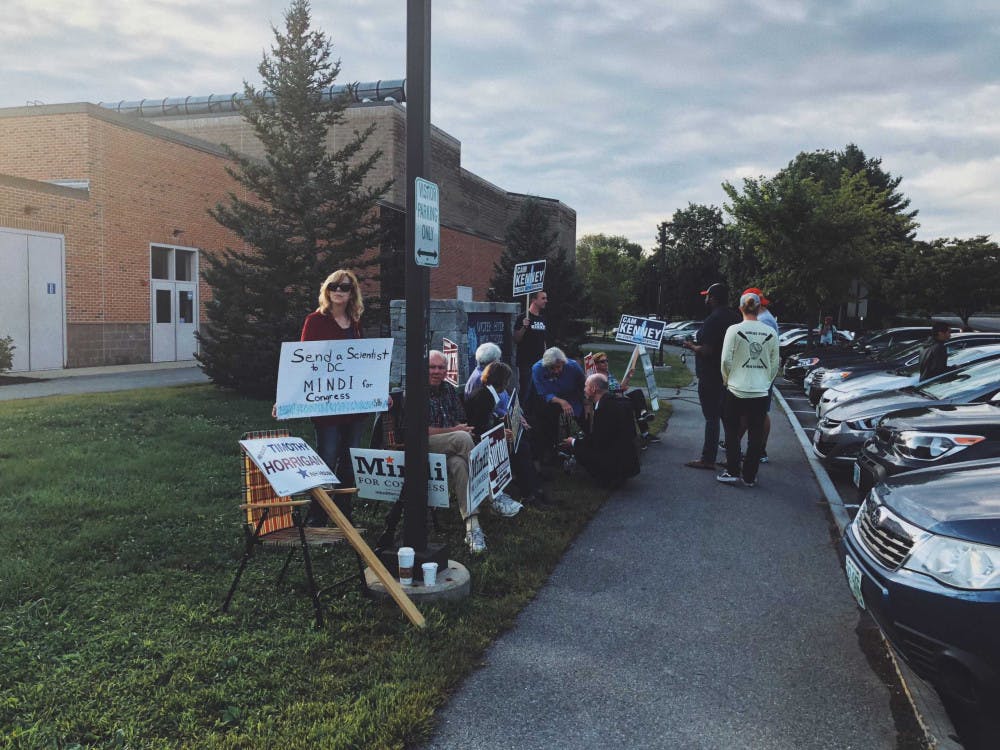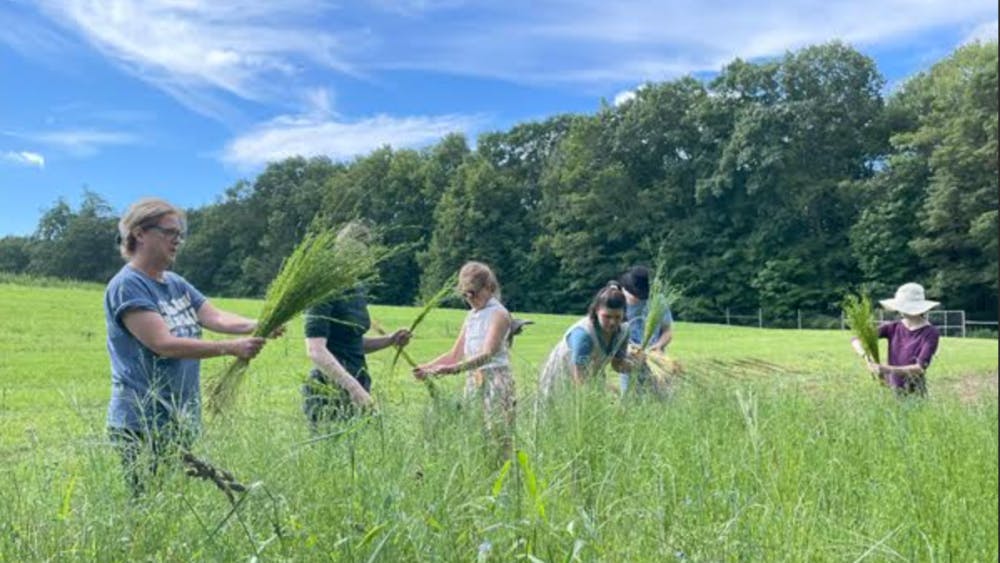Students who climbed the stairs leading to Holloway Commons (HoCo) on Tuesday, Sept. 11 were greeted with a sign reading “go f****** vote, it’s important,” an eye-catching reminder of the power of students in the Granite State’s primary and soon-to-come general election.
Ben Kremer, a senior outdoor education and recreation management and policy dual major, spent between four and five hours at the bottom of the HoCo stairs with doughnuts and pizza, holding this sign and asking every passerby he could if they had yet to vote. If they said no, he urged them to catch a ride in front of the Memorial Union Building (MUB) and handed out flyers with a link to a voter guide in case students believed they were uninformed about the candidates.
Kremer is a founding member, the community organizer and guiding team member of the New Hampshire Youth Movement, a non-partisan progressive movement consisting of young people who work to elect representatives that support young people and their values.
“We worked with a wider coalition of other organizations, mainly NextGen New Hampshire, to give people rides to the polls,” Kremer said. “We basically just spent the day canvassing… Most of the time all it takes is for someone to ask you ‘have you voted?’… It’s pretty easy to convince people most of the time.”
Kremer believes it’s important for young people to vote because young people play a big role in deciding turnouts of elections, especially in New Hampshire.
“Young people decide elections in New Hampshire; in 2016, both the presidential and the senate race was decided by a margin of around or less than 3000 votes, and that was young people,” he said.
Kremer believes that voting is the best way to get officials into political office who will effectively represent today’s youth and their beliefs.
“Nothing is going to change unless you vote,” he said. “What do you expect to happen if you don’t vote? One of the big reasons why we are where we are right now… is because [young] people have let an elite ruling class decide their future for them because they don’t vote… We haven’t effectively leveraged our power to decide a better future for ourselves.”
UNH political science professor Dante Scala agrees with Kremer that it is important for students and other young people to vote because it is a way for youth opinions to be heard.
“Voting tends to be something that older people do a lot more than younger people,” Scala said. “A 70-year-old is a lot more likely to vote than a 20-year-old… If younger people want to be heard that’s the best way to be heard and to balance things out. There’s a lot going on in the country, the best way to have your voice heard is to vote and that’s what gets politicians to listen.”
Scala also believes that practicing voting at a young age can help people to develop better civic habits for the rest of their lives. A 20-year-old voter, according to Scala, may be more likely to vote at age 40 or 60 than if they had started later.
Simon McIntosh, a sophomore electrical engineering major from Nashua, New Hampshire, and Olivia Ferraro, a first-year exercise science major from Bakersfield, Vermont, did not vote in the primary on Tuesday. Both Ferraro and McIntosh did not believe that they had the time to vote.
“You had to take a car ride to the voting booths and Tuesday was pretty busy,” McIntosh said.
McIntosh stated that he did not vote because he hadn’t been able to research the candidates for his party, and believes that as long as students can research their respective candidates, it is important that they vote.
He and Ferraro added that they will vote in the general election in November if they have the time and believe that it is important for student voices to be heard in elections.
Kyle Sanders, a junior mechanical engineering major from Plymouth, NH, also supports students becoming more educated about the candidates before they go and vote.
“I think it’s important for students’ voices to be heard but… I think they should have reasoning behind what they’re saying when they [vote],” he said.
Sanders did not vote in the previous election because he did not feel that he was educated enough, but said that he will vote in the November general election.
This feeling of uncertainty surrounding knowledge about political candidates and what to vote for is common according to Kremer.
“We are surrounded by an overwhelming amount of information that makes us want to throw our hands up… Things feel like they are out of [our] control,” he said.
Scala also believes that busy schedules may have played a role in preventing more students from voting at the beginning of the semester.
“Primaries don’t tend to get as much attention in the news as general elections do and the election occurred early on in the semester,” he said. “There’s like a hundred things going on… Some people might have just missed it because it gets lost in a lot of the other things about getting set up at the beginning of a semester.”
Jason Bortolussi, a senior computer engineering major from Andover, MA, voted in the primary election. He said that he felt like it was the right thing to do, that it was his civic duty and also believes that it is important for young people’s voices to be heard.
“This is the world that we are going to be living in and these are the people who are going to shape it,” he said about the candidates.
Mike McAuliffe, a senior marketing major from Stratham, NH, also voted in Tuesday’s primary. He said that young people are not traditionally the ones who go out and vote, but added that more of the younger population as of late have become politically engaged. McAuliffe, however, stresses that there are still barriers for people of all ages when it comes to voting.
“The drama behind politics nowadays seems to dissuade people from wanting to get involved with it,” he said. “Having to leave school is a barrier for some people because they think they have to take the time out of their day, [and] registering to vote sometimes can be a barrier for some people because they might be lazy.”
Kremer agrees with McAuliffe on the issue of barriers for students and the working class when it comes to voting.
“There is a calculated effort in our state to make it harder for young people to vote,” Kremer said. “Voting to a lot of people seems like a very complicated thing… In addition to that, election day isn’t a holiday… If you ever want a good example of why people don’t vote, that is it, the system is designed to dissuade normal working-class people from voting, people are busy… It’s no wonder that a lot of people don’t vote.”
Scala believes that making voter registration automatic and getting more people ID cards would encourage more people to vote.
“Automatic voter registration would reduce obstacles to voting,” he said. “Why not when you turn 18 be automatically registered to vote and clear away those obstacles?”
Despite the many difficulties that people come across when it comes to voting, Kremer said September 11 saw a record turnout for a midterm primary in Durham with a total of around 1,400 voters. Kremer hopes the turnout for the general election is similarly successful.
“People don’t know this, but if you live in New Hampshire, you have some of the highest voting power in the country,” Kremer said about the importance of voting. “We have incredibly high voter power because of where we are, the demographics of our state… One vote [in New Hampshire] counts more than somebody’s one vote in California essentially.”
The New Hampshire Youth Movement will be doing similar canvassing work “and tenfold” in preparation for the general election in order to get as many young people to vote as possible, according to Kremer.














